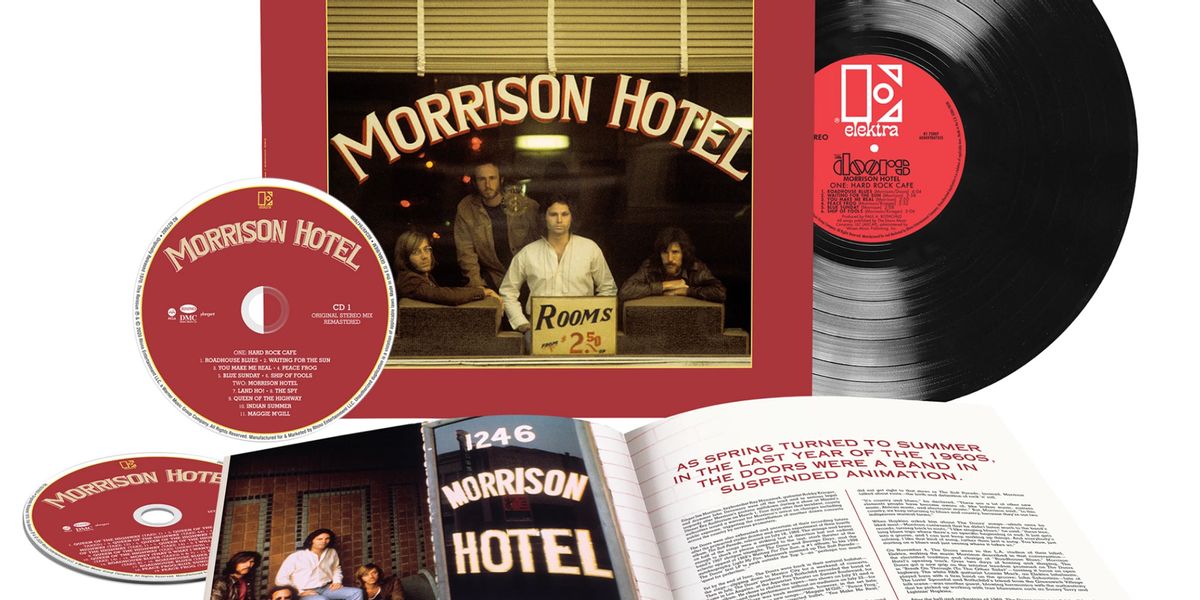Trying to put the Doors in context of their times reveals the paradoxes of their music and career. On the one hand, the band were a singles act with number one records such as “Light My Fire” and “Hello, I Love You” but whose full-length albums outsold their 45s. They wrote and performed quirky pop songs like “People Are Strange” as well as dark and heavy hard rock jams, including “The End”. The Doors’ music could be simple, straight-up barroom blues one minute and complex jazz/classical/rock fusion the next. Frontman Jim Morrison was a sexy, lizard king whose poster decorated many girls’ dorm rooms and a serious creative mind who published intense and purposely profound poetry in non-entertainment publications.
The band released six studio albums in four short years from 1967 to 1971, with fans and critics divided as to whether the act were the real deal or just pretenders to the rock royalty. Morrison Hotel (1970) was their fifth record and functioned as a sort of Rorschach Test for listeners. 1970 was a crazy year, marked by President Richard Nixon’s first term, an escalating war in Vietnam, hundreds of student protests and demonstrations at the nation’s colleges and universities such as the infamous one at Kent Student University in Ohio that left four dead.
Musically, it was the year the best-selling British and American acts like the Beatles, the Supremes, and Simon & Garfunkel broke up. Singer-songwriters like James Taylor, Joni Mitchell, and Neil Young had big successes. The big hit singles ranged from teen heartthrob David Cassidy with the Partridge Family, the pre-teen Michael Jackson, and the safe as milk the Carpenters as well as monster metal albums like Black Sabbath’s Paranoid, Jimi Hendrix’s Band of Gypsies, and Led Zeppelin’s III.
Morrison Hotel made it up to number four on the album charts. This was considered a comeback for the group after the disappointing reception of their previous album (The Soft Parade). In between the two records, Jim Morrison got into serious legal trouble after he reportedly exposed himself at a show in Miami. That resulted in the cancellation of a slew of concert dates. A few months later, he was drunk, disorderly, and arrested aboard an airplane on the way to a Rolling Stones show. At the time, many people wondered if the Doors were washed up. Morrison Hotel’s success proved otherwise, at least temporarily.
Morrison Hotel has its charms. Most notably, the opening track “Roadhouse Blues” is a classic rawk anthem. Morrison sings with lines like “Woke up this morning and got myself a beer” with the passion of one who knows the end is near over a cacophony of boogie-woogie piano, snarling guitar blues, pounding drums, and an uncredited John B. Sebastian on harmonica. For many fans, this is the Doors’ best song ever.
To celebrate the album’s 50th anniversary, Rhino has reissued the release with a two-CD/one-LP set. This includes the original album newly remastered by the Doors’ longtime engineer and mixer Bruce Botnick, plus a bonus disc of more than an hour of unreleased studio outtakes and the original album on 180-gram virgin vinyl. The music will also be available from digital and streaming services.
The bonus disc has many takes, different arrangements, false starts, and studio conversations. For fans of “Roadhouse Blues”, there are five different versions of the song. They are curious oddities and reveal the patience of the other band members (John Densmore, Robby Krieger, Ray Manzarek) and producer Paul Rothchild in the studio with Morrison. He often sounds drunk and in need of direction.
While many other critics have praised the merits of other material on the original Morrison Hotel, the truth is that the songs don’t hold up well. There are flashes of gold on cuts such as the psychedelic “Queen of the Highway”, the soulful groove of “Peace Frog”, and the bluesy “You Make Me Real”, but they don’t stand as complete works and tend to drag. As the outtakes reveal, these are the best versions of these songs (i.e., there nine more versions of “Queen of the Highway” on the additional disc).


